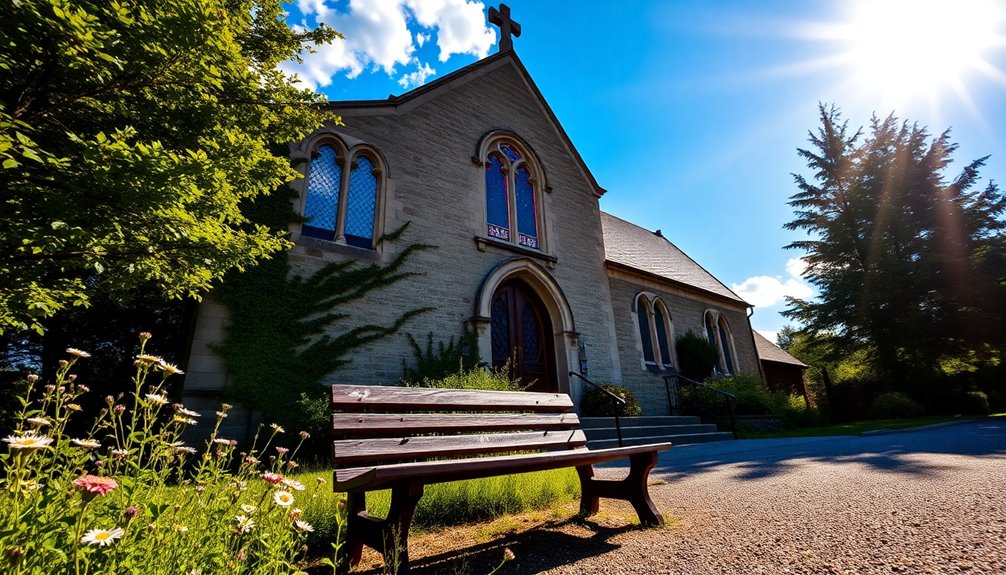The church is a vibrant community of believers in Jesus Christ, where you connect with others for worship, growth, and service. It isn't just a building; it's the Body of Christ, with each member playing a vital role. The church encourages accountability and nurtures relationships among its members. Throughout history, it's adapted and evolved, facing challenges while fulfilling its mission of spreading love and hope. The church engages in worship, edification, and outreach to impact the community positively. If you're curious about its deeper significance and role, there's much more to explore about this meaningful gathering of faith.
Key Takeaways
- The church is a community of believers in Jesus Christ, representing the body of Christ with Christ as the head.
- It encompasses both the universal church and local congregations, emphasizing nurturing relationships and accountability among believers.
- The church engages in worship, edification, and evangelism to strengthen community ties and fulfill its mission.
- Early Christians gathered for mutual support and spiritual growth, highlighting the importance of communal worship and accountability.
- Misunderstandings often depict the church as merely a building, overlooking its broader functions and significance in individual lives and communities.
Introduction
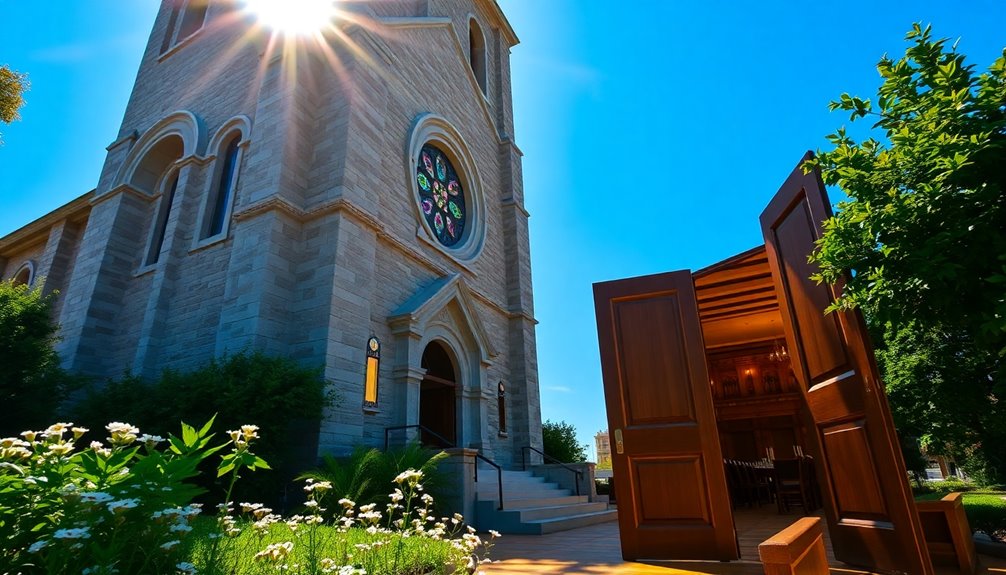
When you think of the church, imagine a vibrant community of believers coming together to share their faith and support one another. The church isn't just a building; it's a dynamic assembly of believers in Jesus Christ, known as the body of Christ. This body functions as a collective, with Christ as its head, promoting unity and spiritual growth among its members.
The church encompasses both the universal church, representing all believers in Christ across the globe, and local churches, which serve as specific gathering points for worship and fellowship within communities. Each local church plays a crucial role in nurturing relationships among believers, allowing them to grow in their faith and hold one another accountable.
Throughout history, the church has adapted to various circumstances, transitioning from meeting in homes during early persecution to establishing dedicated buildings as Christianity spread.
Today, the church continues to fulfill its mission through worship, edification, and evangelism, creating a strong community of believers. Engaging in communal gatherings and outreach activities, the church remains a vital part of the lives of those who seek connection with both God and fellow believers.
Biblical Basis for Church

To understand the biblical basis for the church, you'll want to explore key scriptures that highlight its purpose and function.
From the concept of "ekklesia" in Matthew to the description of the church as the Body of Christ in 1 Corinthians, these passages reveal a vibrant community of believers.
Let's look at both primary and secondary references that shape our understanding of the church's role in God's plan.
Primary Bible References
The church's foundation is deeply rooted in Scripture, providing a clear biblical basis for its existence and purpose. In the New Testament, the term "ekklesia" signifies the assembly of believers called out to worship and serve God, forming local churches that embody the People of God.
The Apostle Paul emphasizes that the church is the body of Christ, illustrating the unity and diversity among its members, with Christ as the head (1 Corinthians 12:12-27; Ephesians 1:22-23).
The Great Commission in Matthew 28:19-20 commands you to go and make disciples of all nations, baptizing and teaching them in the name of the Father, Son, and Holy Spirit. This mission underlines the church's purpose to reach out as a body of believers.
Additionally, Hebrews 10:24-25 encourages you not to neglect gathering together, highlighting the importance of fellowship and mutual encouragement within the church community.
Finally, Ephesians 2:19-22 describes the church as a household of God, built on the foundation of the apostles and prophets, with Christ as the cornerstone, underscoring its spiritual structure and identity.
Secondary Bible References
Numerous secondary Bible references further illuminate the church's identity and mission. In 1 Corinthians 12:27, you see the church described as the "body of Christ," emphasizing the unity and interdependence of believers. Each member plays a unique role, contributing to the health and function of the whole.
Ephesians 2:19-22 portrays the church as a "household of God," showcasing its purpose as a spiritual community built on the foundation of the apostles and prophets, with Christ as the cornerstone.
Hebrews 10:24-25 highlights the importance of gathering together, reminding you that fellowship strengthens your faith and fosters deeper connections among believers.
Matthew 28:19-20, known as the Great Commission, calls you to actively participate in spreading the gospel, reinforcing the church's mission to make disciples of all nations.
Additionally, Acts 2:42-47 illustrates the early church's practices, such as teaching, breaking bread, and prayer, serving as a model for community life and spiritual growth.
Together, these references provide a comprehensive understanding of the church's identity, mission, and the vital role you play within this dynamic body of believers.
Early Church Gatherings' Significance
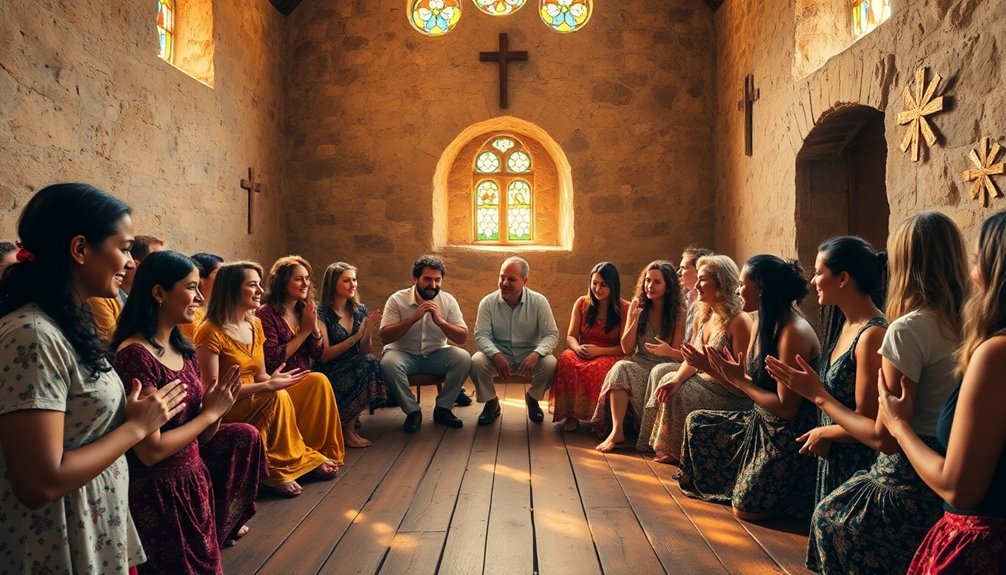
Often overlooked, the significance of early church gatherings reveals the heart of Christian community. In the face of persecution, early Christians found refuge in homes, emphasizing mutual support rather than relying on physical structures. These gatherings fostered a sense of belonging, allowing believers to share teachings, prayers, and communal meals.
The Acts of the Apostles highlights how the early church met regularly for breaking bread and prayer, underscoring the importance of communal worship practices (Acts 2:42). Through these meetings, spiritual growth was nurtured as individuals exercised their spiritual gifts, encouraging and edifying one another in their faith journeys (1 Corinthians 12).
These gatherings weren't just social events; they laid the foundation for local congregations that would become vital for the church's ongoing mission and outreach. By prioritizing community and spiritual connection, the early church established a model for future believers.
In doing so, they cultivated a vibrant faith that thrived amidst adversity. Understanding the significance of these early church gatherings helps you appreciate the roots of your own faith community today.
Historical Context of the Church
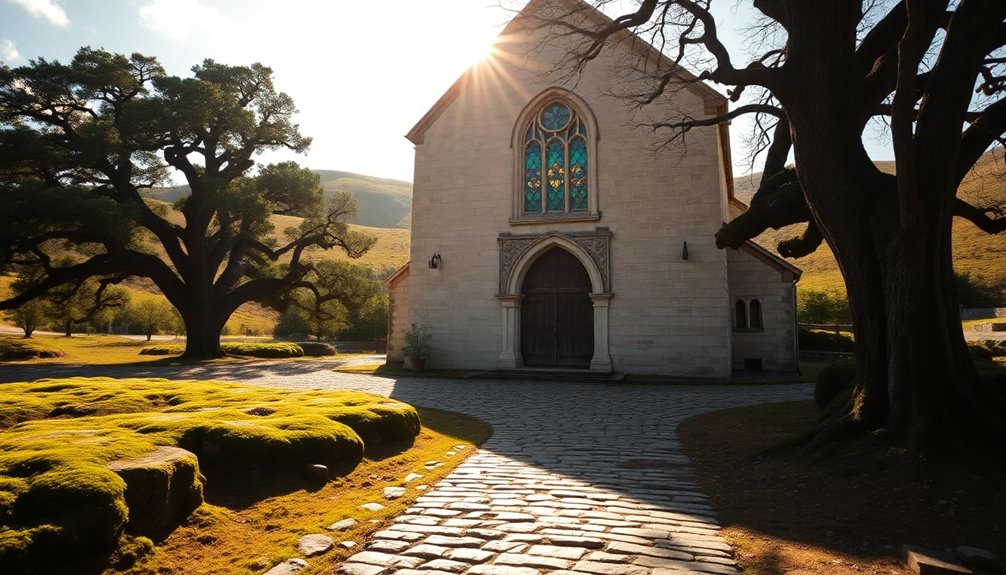
Understanding the historical context of the Church is essential to grasping its evolution and impact on society. The Christian Church originated in Roman Judea during the first century AD, rooted in the teachings of Jesus. Pentecost marks its official beginning when the Holy Spirit descended upon God's people, empowering them to spread the message of Christ.
In its early years, the Church faced intense persecution for refusing to worship Roman gods, a struggle that persisted until the legalization of Christianity in the fourth century under Emperors Constantine I and Theodosius I. By February 27, 380, the Roman Empire adopted Nicene Christianity as its state religion, fostering significant theological developments. This era also saw the first execution of a heretic, Priscillian, in 385, highlighting the growing tensions within the Church.
The Great Schism of 1054 further solidified divisions, creating a rift between the Western Roman Catholic Church and the Eastern Orthodox Church.
Fast forward to the 16th century, the Protestant Reformation, led by figures like Martin Luther and John Calvin, diversified Christianity into numerous denominations, ultimately establishing it as the largest religion worldwide.
Misunderstandings About Church Roles

You might think of the church as just a building, but it's really a community of believers united in Christ.
Many also have different interpretations of scripture that can lead to confusion about what the church is meant to be.
Let's unpack these common misconceptions and explore the true role of the church in your life.
Debunk Common Church Misconceptions
The church is frequently mischaracterized, leading to misunderstandings about its true roles and functions. Many think of the church as just a physical building, but it's fundamentally a community of believers, defined by the Greek term "ekklesia," meaning assembly or called-out ones.
You might believe that all members of a local church automatically belong to the universal church, but genuine faith in Jesus Christ is the true criterion for membership in this universal body.
Another common misconception is that the church's primary role is simply to hold services. In reality, the church is comprised of worship, edification, and evangelism, all aimed at fostering spiritual growth and community among believers.
It's important to distinguish between the visible church, which may include nonbelievers, and the invisible church, which truly represents the body of Christ.
Lastly, some view the church as merely a denomination, yet it's more accurately defined by a collective faith in Jesus Christ. This perspective transcends organizational affiliations and emphasizes unity among diverse congregations.
Understanding these distinctions clarifies the church's mission and strengthens your connection to this vibrant community.
Diverse Interpretations of Scripture
Diverse interpretations of Scripture often lead to significant misunderstandings about the church's roles and responsibilities. Many people mistakenly view the church as merely a physical building, forgetting that it's truly a community of believers. Romans 16:5 highlights how churches met in homes, emphasizing the importance of connection among God's people.
This misunderstanding can blur the lines between believers and nonbelievers, leading to misconceptions about true membership in the body of Christ, as seen in 1 Corinthians 12:13. When the church's primary functions—worship, edification, and evangelism—are misinterpreted, it can hinder communal spiritual growth and accountability among members.
Local churches serve as vital fellowship points for the universal church, yet some people mistake denominational differences for divisions within the body of Christ (Galatians 1:2). Moreover, the belief that all members of a local church automatically belong to the universal church underscores the need for discernment regarding genuine faith in Jesus Christ.
Ultimately, accountability within local congregations is essential for fostering a true sense of community among believers, ensuring everyone is growing together in their faith.
Serving in Local Outreach

When you volunteer in local ministries, you're not just helping your community; you're living out the church's mission.
Engaging in local service opportunities can deepen your faith while making a real difference in the lives of those around you.
Together, you and your fellow church members can create lasting impact and foster meaningful connections within your neighborhood. Additionally, participating in outreach programs allows you to celebrate the bond of unconditional love that unites your community in service and support.
Volunteer in Local Ministries
Volunteering in local ministries offers countless opportunities to make a meaningful impact in your community. As a part of God's people, you can address pressing needs like food insecurity, education, and healthcare access. Many local churches have outreach programs that welcome volunteers to participate in initiatives such as homeless shelters, food pantries, and after-school tutoring for children.
By engaging in local ministry, you not only help those in need but also build relationships within your community, fostering a sense of belonging. This active participation promotes the church's role as a supportive presence, demonstrating the love of Christ.
Volunteering allows you to develop new skills and gain invaluable experience in leadership, event planning, and community organizing. Each effort contributes to fulfilling the Great Commission, as you share hope and love with those around you.
Local Service Opportunities
Engaging in local service opportunities allows you to put your faith into action while addressing the needs of your community. Local outreach programs often collaborate with community organizations to tackle pressing issues like food insecurity, homelessness, and educational support for underprivileged children. By participating in these initiatives, you not only contribute to meaningful change but also deepen your understanding of the challenges your neighbors face.
Many churches organize regular service days where you can volunteer your time and skills for various community projects. Whether it's a park clean-up, a food drive, or tutoring sessions, these acts of service are essential for fostering community bonds. Your involvement can lead to the establishment of vital resources, such as clothing banks and meal services, that support vulnerable populations in your area.
Moreover, engaging in local outreach fosters your spiritual growth. It encourages you to live out your faith through selfless acts, helping you develop empathy and a greater connection to those in need. By serving others, you not only uplift your community but also enrich your own spiritual journey.
Church's Role in Community
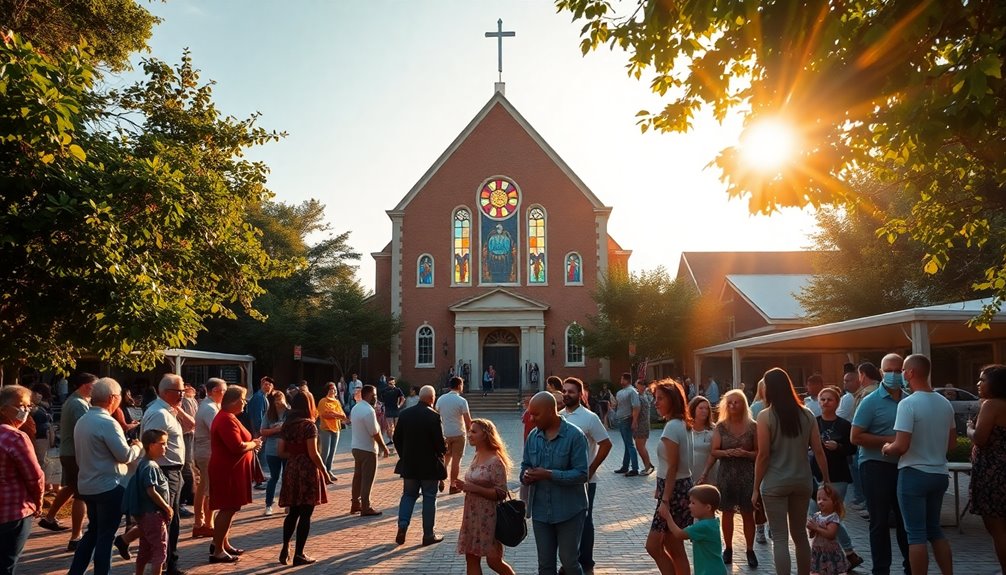
In many communities, the church stands as a vital hub for believers, fostering unity and spiritual growth. As God's people, you come together in fellowship, creating a supportive environment that nurtures relationships and encourages accountability. This koinonia, or fellowship, helps you and others grow spiritually and develop personally, as you share life's ups and downs.
The church serves as a platform for communal activities where you can engage with fellow believers, apply biblical principles, and deepen your connection with the Body of Christ. Through collective worship and teaching, you experience encouragement that strengthens your faith.
Moreover, the church plays a crucial role in outreach, allowing you to fulfill the Great Commission by sharing the gospel and serving your community (Matthew 28:18-20). Each member contributes uniquely to the church's mission, reinforcing the idea that everyone has an important role in building up the community and enhancing its overall health (Ephesians 4:11-13).
In this way, the church isn't just a place of worship; it's a vibrant community where believers unite, grow, and impact the world around them.
Additional Resources
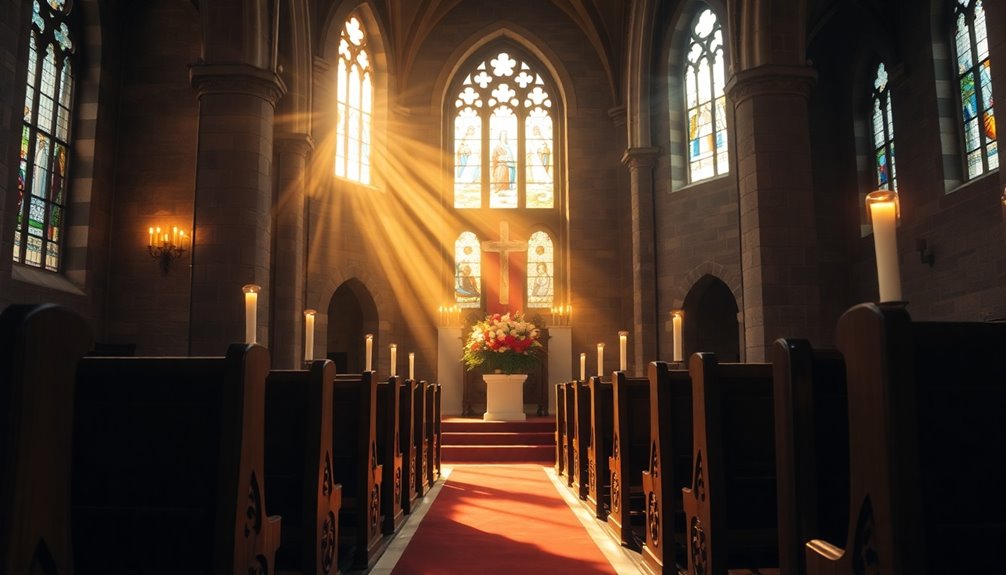
For anyone seeking to deepen their understanding of the church, a variety of resources are available that offer valuable insights into its identity, mission, and communal life.
Derek Thomas's "What Is the Church?" provides a concise examination of the church's theological significance and its role as God's people in the world. Similarly, Edmund P. Clowney's "The Church" dives into the doctrinal implications of the covenant community, emphasizing its structure and mission within the Christian church.
G. K. Beale's "The Temple and the Church's Mission" connects the Old Testament temple to the New Testament church, illustrating its purpose in God's grand design.
For a more comprehensive exploration, Gregg R. Allison's "Sojourners and Strangers" examines the implications of being part of the body of Christ, reinforcing the idea of the family of God.
Lastly, "The Community of Jesus," edited by Kendell H. Easley and Christopher W. Morgan, offers a thorough theology of the church, addressing critical images of the church and the importance of the communion of saints in contemporary faith practices.
These resources can significantly enhance your understanding of the church's vital role in your spiritual journey.
Frequently Asked Questions
What Is the True Meaning of the Church?
The true meaning of the church goes beyond a building or denomination; it's about community and faith.
You'll find that the church represents a gathering of believers united in Christ, forming a spiritual body. This fellowship is essential for worshiping God, encouraging one another, and sharing the Gospel.
When you engage with others in this way, you embrace the church's mission, enriching your spiritual journey and strengthening your connection with fellow believers.
What Is the Church According to the Bible?
According to the Bible, the church is a community of believers united in faith, known as the body of Christ.
You're called to play a unique role within this body, fostering unity and support among fellow believers.
The church isn't just about a building; it's about relationships.
You'll find purpose in the Great Commission, making disciples and baptizing others, all while nurturing a deep, covenantal bond with Christ, the Bridegroom.
How Do You Explain a Church?
When you explain a church, think of it as a community of believers united in faith.
It's not just a building; it's where spiritual growth happens through worship, teaching, and fellowship.
You'll find a sense of belonging and support among members who share similar beliefs.
The church serves as a place for encouragement and accountability, helping you deepen your relationship with God and live out your faith in everyday life.
What Is the Church and Its Purpose?
The church is a vibrant community of believers, and its purpose is to worship God, encourage one another, and spread the Gospel.
You're part of a body that grows spiritually together, fostering fellowship and accountability.
Through teaching and service, you reflect Christ's love and grace in the world.
Engaging in local gatherings, you find a space for communal worship and development, allowing you to actively participate in God's mission on earth.

